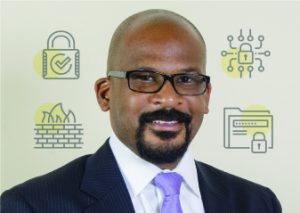The thread connecting Nnake Nweke’s career as an engineer, lawyer, cybersecurity specialist, and nonprofit leader is simple: He loves an intellectual challenge.
It’s the reason Nweke, PhD ’06, became an electrical engineer and the reason he went on to earn a law degree from the University of Maryland in 2010. It’s also what drives him in his new role as the first director of the Office of Internet Freedom for the Broadcasting Board of Governors, an independent federal agency responsible for all U.S. government–supported, civilian international media.
 “The United Nations declared access to the internet as a fundamental human right. It’s the platform on which we express ourselves,” says Nweke, who assumed the helm of the new office in late July. “It’s where we learn and exchange ideas. Everything depends upon it. His office’s goal is to ensure that people anywhere can access the internet on any platform of choice to share information freely. In that quest, he is principal adviser to the BBG’s CEO, its board, and its five networks—the Voice of America, Office of Cuba Broadcasting, Radio Free Europe/Radio Liberty, Radio Free Asia, and the Middle East Broadcasting Networks.
“The United Nations declared access to the internet as a fundamental human right. It’s the platform on which we express ourselves,” says Nweke, who assumed the helm of the new office in late July. “It’s where we learn and exchange ideas. Everything depends upon it. His office’s goal is to ensure that people anywhere can access the internet on any platform of choice to share information freely. In that quest, he is principal adviser to the BBG’s CEO, its board, and its five networks—the Voice of America, Office of Cuba Broadcasting, Radio Free Europe/Radio Liberty, Radio Free Asia, and the Middle East Broadcasting Networks.
His new role requires creative problem-solving and collaboration—and Nweke’s technical and legal acumen. After studying at Johns Hopkins, he worked for the National Security Agency as a research engineer, mostly on novel encryption technologies. While in law school, Nweke worked for a Washington, D.C., patent law firm but left to return to cybersecurity as an engineer at the Johns Hopkins University Applied Physics Laboratory. “Patents weren’t broad enough for the technology issues I am interested in. Technology has exploded, but the legal side has not caught up,” he says, citing as an example the recent encryption case with Apple, following the San Bernardino shootings.
Nweke’s tenure at the Federal Communications Commission—first as a senior engineer in the Public Safety and and Homeland Security Bureau’s Cybersecurity and Communications Reliability Division, then as a branch chief in the Office of Engineering and Technology—earned him a Meritorious Civilian Service Award from the bureau for his outstanding contributions in cybersecurity. In January 2015, he founded the nonprofit Science and Technology Policy Center for Development to assist developing nations, particularly in Africa, in crafting and implementing comprehensive science and technology policies.
Nweke relishes the “cat and mouse” aspect of his new job, which involves a constant effort to circumvent the blocking of internet access by repressive governments, with each side trying to outwit the other. In his cybersecurity career, he used encryption to prevent hackers from seeing a computer user’s confidential data. Now, he and his team provide encryption tools to citizens worldwide so that they can access or share censored internet information freely. “We work to support freedom and democracy around the world,” he says.




